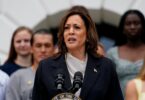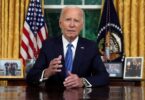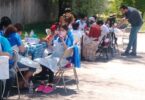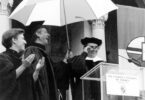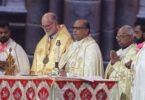
Dominican Father Michael Sweeney, pictured in a 2007 photo, brings an evangelizing spirit and academic credentials to his new role as director of the Archdiocese of San Francisco’s revamped diaconate formation program. (CNS photo/Greg Tarczynski, courtesy Dominican School of Philosophy and Theology)
by Valerie Schmalz
SAN FRANCISCO (CNS) — Dominican Father Michael Sweeney brings an evangelizing spirit and academic credentials to his new role as director of the Archdiocese of San Francisco’s revamped diaconate formation program.
The preparation to be ordained a deacon was altered beginning last fall and now includes more academic rigor, including five hours of biweekly Saturday courses at St. Patrick Seminary & University taught by seminary professors and another two and a half hours “to process it, focus it” each month at the archdiocesan pastoral center, Father Sweeney said.
“Jesus shows us things we wouldn’t know otherwise. We want to see with him and judge with him and act with him. The purpose of formation is to see with him, to act with him. That is believing,” Father Sweeney told Catholic San Francisco, the archdiocesan newspaper. “The faith is not a burden. Rather, it wakes everything up.”
Father Sweeney accepted the invitation from Archbishop Salvatore J. Cordileone to head the program after much thought because of his commitment to the formation of the ordained and of the laity, he said.
Father Sweeney was president of the Dominican School of Philosophy and Theology at the Graduate Theological Union in Berkeley from June 2004 to July 2015. He continues to be active in the Catherine of Siena Institute, which he co-founded in 1997 with Sherry Weddell, a laywoman, to assist parishes to provide formation for laymen and laywomen. The institute has addressed over 50,000 Catholics throughout North America and Asia. Father Sweeney spent four years as a parish priest and had several stints as a college chaplain.
Father Sweeney has developed and offered workshops in priestly formation, the theology of the laity, the theology of vocation, the theology of pastoral governance and Catholic social teaching, according to the Dominican school’s website. He taught classes at the graduate Dominican school on the role of the laity in the church, particularly in light of the documents of the Second Vatican Council and St. John Paul II.
The archdiocese’s current class of 16 prospective deacons attended two classes of philosophy in the fall: logic and a general introduction to the philosophical ideas that have been important in the church’s theological development, he said. In the spring, they are studying the Old Testament, Catholic Church history and fundamental theology, Father Sweeney said. The five-year program began last year, but after one semester, was suspended for the spring semester to alter the approach, he said. They are scheduled to be ordained in the spring of 2020.
The deacons need an academic grounding in theology, philosophy, Scripture and church history because of the significance of their office in the life of the Catholic Church, said Father Sweeney.
“The archbishop wanted more theological formation for the men than perhaps we have given in the past,” said Father Sweeney. “As ordained, we are entrusting them with the Word. They will baptize, witness marriages, preach. They will conduct at graveside the rite of interment.”
“The lovely thing about the aspirants is they possess a real and sober enthusiasm,” Father Sweeney said of the 16 men who comprise his first class.
“Because the permanent deacons are generally married, they are themselves parents. They are in a wonderful place to bridge the church’s tradition with lay commitments,” Father Sweeney said.
He said he encourages the wives of the prospective deacons to attend as many classes as they are able to, since even though they are not ordained, nevertheless by marriage they also are accepting this vocation.
“Parishes tend to be anonymous. We don’t know people’s names. We don’t know their circumstances. Diaconal service is to make sure no one in the parish is anonymous,” said Father Sweeney. “It says in the Acts of the Apostles that the apostles chose the deacons for the service of table. It was to know the particular circumstances of everyone in the community and to make sure they were provided for.”

